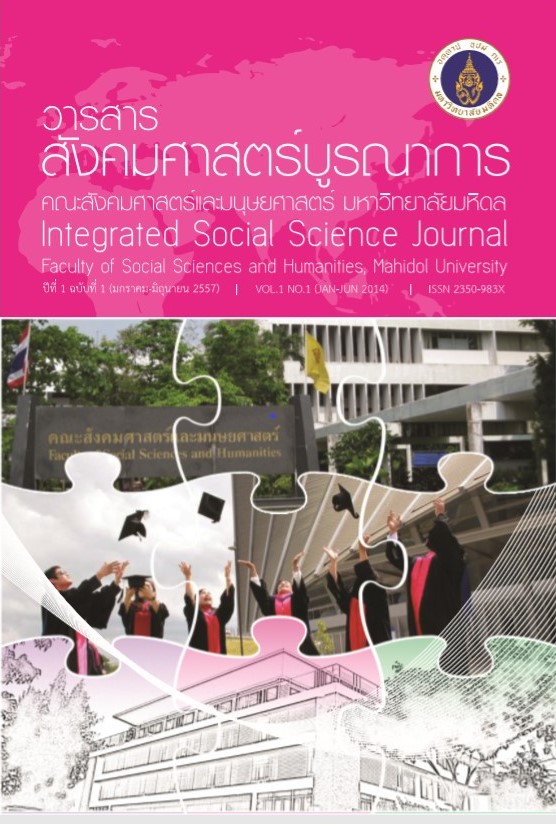A Critical Review of Online Education A Critical Review of Online Education
Main Article Content
บทคัดย่อ
การศึกษาผ่าน Internet ทำให้คนสามารถเข้าถึงการศึกษาได้มากขึ้น สนับสนุนการเรียนรู้ตลอดชีพ และสนับสนุนความสามารถทางเทคโนโลยีในสังคมเทคโนโลยีปัจจุบัน ถึงแม้ว่าการศึกษาผ่าน Internet จะมีข้อดีแต่ก็มีนักวิจารณ์หลายคนไม่เห็นด้วยกับการศึกษาผ่าน Internet เพราะนักเรียนจะรู้สึกโดดเดี่ยวและไม่มีส่วนร่วมกับกระบวนการการเรียนรู้ วิชาและหลักสูตรออนไลน์มีนักเรียนเลิกเรียนกลางคันเยอะ การเรียนรู้ออนไลน์ไม่สามารถพัฒนาทักษะบางอย่างได้ นักเรียนไม่มีสไตล์การเรียนรู้หรือทักษะการเรียนรู้ที่เหมาะสมกับวิชาออนไลน์ และอาจารย์ไม่มีสไตล์การสอนและทักษะการสอนสำหรับวิชาออนไลน์ ในความเป็นจริงงานวิจัยกลับชี้ว่าข้อวิพากษ์วิจารณ์เหล่านี้ไม่เป็นความจริง หรือไม่จริงอีกต่อไปแล้ว คุณภาพการศึกษาผ่าน Internet ไม่ได้แย่อย่างที่คิดเพราะมีการค้นคว้าเกี่ยวกับคุณภาพการศึกษาผ่าน Internet และมุมมองของนักเรียนและผู้จ้างงานต่อการศึกษาผ่าน Internet สำคัญมาก ดังนั้นบทความนี้จึงจบด้วยข้อเสนอแนะสำหรับการจัดการการศึกษาผ่าน Internet
Article Details
- วารสารสังคมศาสตร์บูรณาการ มหาวิทยาลัยมหิดล อนุญาตให้สามารถนำไฟล์บทความไปใช้ประโยชน์และเผยแพร่ต่อได้ โดยอยู่ภายใต้เงื่อนไขสัญญาอนุญาต CC Attribution-NonCommercial-NoDerivatives 4.0 International (CC BY-NC-ND 4.0) โดยต้องแสดงที่มา/การอ้างอิงจากวารสาร – ไม่ใช้เพื่อการค้า – ห้ามแก้ไขดัดแปลงเนื้อหา
- ข้อความที่ปรากฏในบทความในวารสารฯ เป็นความคิดเห็นส่วนตัวของผู้เขียนแต่ละท่าน ไม่เกี่ยวข้องกับกองบรรณาธิการวารสารฯ (ซึ่งหมายรวมถึง บรรณาธิการ ผู้ทรงคุณวุฒิในกองบรรณาธิการ หรือ บรรณาธิการรับเชิญ) แต่อย่างใด ความรับผิดชอบองค์ประกอบทั้งหมดของบทความแต่ละเรื่องเป็นของผู้เขียนแต่ละท่าน หากมีความผิดพลาดใด ๆ ผู้เขียนแต่ละท่านจะรับผิดชอบบทความของตนเอง ตลอดจนความรับผิดชอบด้านเนื้อหาและการตรวจร่างบทความเป็นของผู้เขียน ไม่เกี่ยวข้องกับกองบรรณาธิการวารสารฯ
- กองบรรณาธิการขอสงวนสิทธิ์ในการตัดทอน/ปรับแก้ถ้อยคำบางประการเพื่อความเหมาะสม
เอกสารอ้างอิง
Caudron, S. (2001). Evaluating e-degrees. Workforce, 80(2), 44-49.
Columbaro, L. N. & Managhan, C. (2009). Employer perceptions of online degrees: a literature review. [Web Site] Retrieved on March 25, 2014 from http://www.westga.edu/~distance/ojdla/spring121/columbaro121.html
Drago, W., Peltier, J. W., Hay, A., & Hodgkinson, M. (2005). Dispelling the Myths of Online Education: Learning via the Information Superhighway. Management Research News, 28(7), 1-17.
Eom, S. B., Wen, J., & Ashill, N. (2006). The Determinants of Students’ Perceived Learning Outcomes and Satisfaction in University Online Education: An Empirical Investigation. Decision Sciences Journal of Innovative Education, 4(2), 215-235.
Grasha, A. & Yangarber-Hicks, N. (2000). Integrating teaching styles and learning styles with instructional technology. College Teaching, 48(1), 2-11.
Hillman, S. J. & Corkery, M. G. (2010). University infrastructural needs and decisions in moving towards online delivery programmes. Journal of Higher Educational Policy and Management, 32(5), 467-474.
Kuo, Y., Walker, A. E., Belland, B. R., & Schroder, K. E. E. (2013). A Predictive Study of Student Satisfaction in Online Education Programs. The International Review of Research in Open and Distance Learning, 14(1), 16-39.
Langan, T. (1997). Online education: a student’s perspective. Campus-Wide Information Systems, 14(4), 128-132.
Lauver, K. J., Drum, D. M., Windsor, J. M., & Miller, S. M. (2013). Preference of education mode: Examining the reasons for choosing and perspectives of courses delivered entirely online. Journal of Applied Research in Higher Education, 5(1), 113-128.
Linardopoulos, N. (2012). Employers’ perspecrives of online education. Campus-Wide Information Systems, 29(3), 189-194.
Lofstrom, E. & Nevgi, A. (2007). From strategic planning to meaningful learning: diverse perspectives on the development of web-based teaching and learning in higher educational. British Journal of Educational Technology, 38(2), 312-324.
MacKeogh, K. & Fox, S., (2009). Strategies for Embedding e-Learning in Traditional Universities: Drivers and Barriers. Electronic Journal of e-Learning, 7(2), 147-154.
Roberts, C. (2008). Implementing Educational Technology in Higher Education: A Strategic Approach. The Journal of Educators Online, 5(1), 1-16.
Rodriguez, M. C., Ooms, A., & Montanez, M. (2008). Students’ Perceptions of Online-learning Quality given Comfort, Motivation, Satisfaction, and Experience. Journal of Interactive Online Learning, 7(2), 105-125.
Shapiro, J. P. (2006). Ethical Decision Making in Turbulent Times: Bridging Theory with Practice to Prepare Authentic Educational Leaders. Values and Ethics in Educational Administration, 4(2), 1-8.
Shea, R. & Boser, U. (2001). So where’s the beef? U.S. News & World Report, 131(15), 44-51.
Shelton, K. (2010). A Quality Scorecard for the Administration of Online Education Programs: A Delphi Study. Journal of Asynchronous Learning Networks, 14(4), 36-62.
Soderstrom, T., From, J., Lovqvist, J., & Tornquist, A. (2012). The Transition from Distance to Online Education: Perspectives from the Educational Management Horizon. European Journal of Open, Distance and E-Learning. Retrieved from http://www.eurodl.org/?article=513
Song, H. & Kang, T. (2012). Evaluating the Impacts of ICT Use: A Multi-Level Analysis with Hierarchical Linear Modeling. The Turkish Online Journal of Educational Technology, 11(4), 132-140.
Vogel, L. R. (2012). Leading with Hearts and Minds: Ethical Orientations of Educational Leadership Doctoral Students. Values and Ethics in Educational Administration, 10(1), 1-12.


